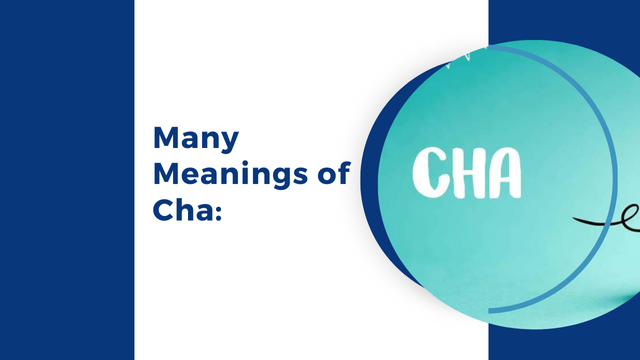Many Meanings of Cha : Culture and Globe Towards Understanding
The word “Cha” denotes diverse meanings and significance across cultures, languages, and contexts. From its association within tea to those connected with names or even traditions, “Cha” is indeed a term that alludes to history and culture. This article serves to identify the potentials of “Cha,” its interpretation in communication, tradition, and daily experience.
1. Because of this the tea is Cha
“Cha” as one of the finest words refers to tea. Most of the time, “Cha” or the word that sounds with “Cha” is almond from a country in most part of the worlds especially in Asia: that is actually the loath from the Chinese word 茶 ([sh]chá), which has been modeled to many such languages like
Japanese: 茶 (cha)
Korean: 차 (cha)
Hindi: चाय (chai)
Swahili: Chai
Arabic: شاي (shai)
The propagation of the term “Cha” itself reverberates through the moving history of tea around the ancient Silk Road and through sea trade routes in different countries. Countries that acquired tea through land routes, for example India and the Middle East, then use the derivatives ‘Cha’, while in the later discovered those via sea routes, like English-inhabited countries, use derivatives of ‘Tea’, ultimately resulting from their Fujianese dialect te.
Cha did, in fact, celebrate a triumph on every continent. The worth of cha has indeed gone beyond that of a drink; as many would appreciate, the term cha would be and still is much more than a word used to denote the act of drinking. It is a core cultural element in societies. It is an integral part of Chinese tea ceremonies, the Japanese chanoyu or tea ceremony, and British afternoon tea. This cultural import as a means of connection, reflection, and custom is incomparable.
2. Changes from “Cha” to Names and Titles
In certain cultures, “Cha” can also be affiliated with first and last names. For example: Korean Family Name: Cha is a rather rare surname in Korea (차). It has origins in the ancient kingdom of Korea, called Goguryeo. For bearers, this name means pride and heritage. In Indian Names: Chai or Cha can also be a part of names or nick names, indicating more towards the culture of tea consumption or warmth associated with tea preparation.
3. Cha in Music and Dance
Cha-cha-cha is a Latin dance the origins of which are traced to Cuba. This involves a lively rhythm and flirty movements, which soon became famous all over the world in the 20th century. The name has been derived from the sound made by the feet of the dancers while sliding along the floor rhythmically with the music. Cha-cha-cha embodies the full Cuban culture; this cheerfulness and richness in it has attracted the ballroom dance competitions worldwide. Dance music is as lively, consisting of syncopated rhythms and a mixture of Afro-Cuban and Western influences.
4. Cha (as a Prefix or Root Word)
Cha could be a root or prefix in many languages. This is its strong point. For instance: In Chinese, “cha” means “to investigate” or “to check,” as in “查找” (cházhao, to search for). It can also be part of compound words in Japanese, such as “抹茶” (matcha, powdered green tea). In English, “Cha” can appear in any number of new coinages, usage in colloquialisms, or slang, thereby making it more fun in communication.
5. Cha in Modern Culture
“Cha” has become a part of modern pop culture as well. The use of the sound tends to be more playful or rhythmic-that is, in music, movies, or slang. Some examples are: K-pop: “Cha” can easily find a space in temple lyrics or as an artist’s stage name in K-pop to define energy and rhythm. Pop Culture Catchphrases: It creates lively energy through repetition, as seen in phrases such as “Cha-cha!” or “Cha-cha-cha.”
6. Cha: Symbol of Hospitality
Tea (Cha) is a popular beverage in many cultures that has been considered a gesture of hospitality and friendship. In China, pouring tea for a guest is a mark of respect. In India, chai is at the heart of every welcome into someone’s home. Mint tea is associated in Morocco with a process that is considered ceremonial, warm, and generous. “Cha” does the world over from bringing people together to connecting people, underscoring how universal is its role.
Conclusion
“Cha” is an interesting word which quite carries a lot of cultural and historical weight in such a few strokes. Whether as tea, a surname, a dance form, or simply as a mark of hospitality, “Cha” is embedded in the daily lives of everyone worldwide. It signifies the interconnectedness of cultures and the experience common to all humanity of such moments that form memories through exhales of happiness, shared ties, and tradition. From the sharing of chai through the clamorous beat of cha-cha-cha, the meaning of ‘Cha’ goes beyond borders indeed because it celebrates both rich diversity and oneness within humanity’s heritage globally.
ALSO READ THS: The Concept of Han: A paper seeking to understand the culture and history of a place
The Concept of Han: A paper seeking to understand the culture and history of a place

